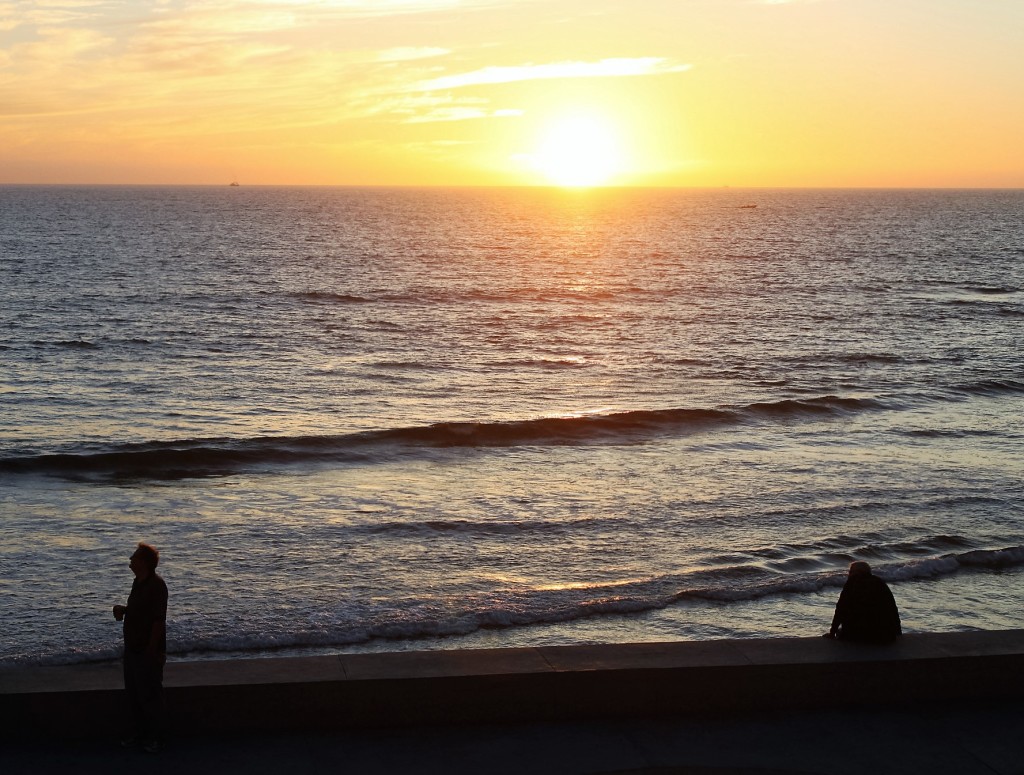The sun was sinking, the day finally ending. I sat on the beach in Mazatlán, propped against my pack, swim trunks still damp under my jeans. At this hour, the beach was empty.
The night before I’d stopped in Mazatlán, a city on Mexico’s northwestern coast, to break up the long bus trip from Tijuana to Guadalajara. Back in Seattle, the Sunday travel section had made the place sound like paradise. All I’d found was a gloomy hotel room, an ocean too hot for swimming, Gila monsters splashing in an open sewer nearby, and a couple of scrawny teenagers humping alongside a broken concrete path near the beach.
The bus to Guadalajara would arrive in an hour, but I didn’t feel like waiting in the bus station. I opened up a book and started reading on the beach.
When I looked away for a moment to check my watch, a voice behind me mumbled something in Spanish. “Hmm?” I muttered, caught off guard. It must have sounded like an invitation.
A young man, probably in his late teens, stepped in front of me. He was dressed in filthy khaki shorts and a faded T-shirt, his feet bare and his face thin and bony. My heart sank. As much as I disliked being hit up for money, there was no way I was going to head off to that grungy bus station just yet.
He sat down facing me, one leg stretched out on the sand, the other bent under him. A tattoo on his upper left arm said “Rosie” in red, a small turquoise heart with an arrow through it slanting down across the letters. He asked my name. “Paul,” I said. “Antonio,” he said, nodding.
“Autobús to Guadalajara,” I said, “at, uh … ocho horas.” I wanted to make clear I’d be leaving soon.
He started talking to me, his eyes cast downward, in Spanish and broken English. I couldn’t understand much of either. What I did understand was that he was obsessed with someone called “the butcher.” “Oh, Paul,” he’d moan, looking up to meet my eyes, his voice almost weepy, “the butcher … the butcher.”
He seemed harmless enough. Now and then he’d pick up a handful of sand and let it sift through his fingers. He might have thought I understood what he was saying, but he might not have cared. More than anything, it seemed he just wanted to tell his story. I had a feeling that if I didn’t give him something, he’d be disappointed, but not angry.
I sat there listening, nodding, trying to understand. I began to get restless. The dusk was deepening. The last thing I wanted was to get stuck in that place another day.
I put one hand on my pack, pushed myself up, and stuffed my book into one of the side pouches. “Autobús,” I said, gesturing toward the bus station. I dug into my jeans and held out some coins. When he reached for them, I saw the needle marks. “Gracias,” he said, quietly.
I hoisted the pack and started up the beach toward the bus terminal. I was a little shaken; I’d never seen needle marks before. The money was going for his habit—that was obvious—but it didn’t really bother me. He was hurting. What nagged at me was that stuff about the butcher. Why did it torment him so?
I tramped along the sand, thinking about it. Suddenly, it hit me: the needle marks … the pusher.
Jesus, I thought, slowing my walk, he didn’t even have the guile to disguise why he needed the money.
What must his story have been? Tethered to his pusher, and tortured by it? He wasn’t alone—there was Rosie—but what would that have been like? Sad, I suspected. But maybe she gave him hope. Maybe she was what kept him going.
I turned and looked back. He was far down the beach now, walking away with his head down, a shadow merging into the darkness.
Paul Michelson Paul Michelson lives and writes in Davis, California.
- Follow us on Twitter: @inthefray
- Comment on stories or like us on Facebook
- Subscribe to our free email newsletter
- Send us your writing, photography, or artwork
- Republish our Creative Commons-licensed content

